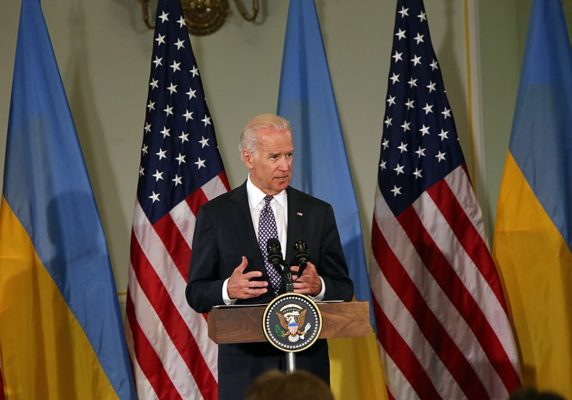 Biden speaking in Ukraine, 2014. Photo courtesy U.S. Embassy Kyiv.
Biden speaking in Ukraine, 2014. Photo courtesy U.S. Embassy Kyiv.
Biden-Zelensky Summit: pipelines and peace up for discussion
President Biden and his Ukrainian counterpart, Volodymyr Zelensky, are set to meet in Washington on August 30th, months after Zelensky appealed for an in-person meeting prior to the Biden-Putin summit in Geneva.
The upcoming meeting is intended to underline the United States’ “unwavering support for Ukraine’s sovereignty and territorial integrity,” a message that the Biden administration has been holding firm to since both presidents spoke by phone in April. For Zelensky, the meeting is an affirmation of Western support. Beyond the diplomatic messaging, however, there are three primary issues that the Presidents will most likely discuss at the end of the month.
The biggest subject to tackle will be the Nord Stream II pipeline deal that was reached between the U.S. and Germany last month. The nearly complete pipeline will reduce Russia’s dependency on old Ukrainian lines and instead will directly connect Russia to Germany and nearly double Russia’s natural gas exports. Nord Stream II has been dubbed a win for Russia and a loss for Ukraine. A 2019 gas transit deal ensures that Russia will continue to ship some gas through Ukraine, but once the agreement expires in 2024, Russia may use the new Nord pipeline to completely bypass Ukraine, leaving the country without its vital gas transit fee revenue and at risk of Russia cutting off its gas supply as a means of coercion.
Although the U.S. and Germany both committed to support Ukraine and help the country develop energy independence, Zelensky has insisted that the pipeline threatens Ukrainian national security and may ask for stronger guarantees during the summit. Biden may need to use the summit to convince Zelensky that the Nord, now effectively a fait accompli, could still work in his favor by providing Ukraine an opportunity to join Europe’s energy transition and become an exporter of green energy to the EU.
Biden and Zelensky will likely touch on the ongoing conflict in Eastern Donbas, where war between Ukraine and Russia-backed separatists has been ongoing since the Euromaidan protests and Russia’s annexation of Crimea in 2014. Though the war is currently in the midst of a ceasefire negotiated in July 2020, ceasefire violations are regularly reported. Furthermore, Putin’s build-up of troops at the Ukrainian border this past April, along with a recent uptick in fighting and casualties, both military and civilian, is indicative that the conflict is far from frozen.
The most recent peace negotiations have been conducted in Normandy Four-style summits between Ukraine, France, Germany, and Russia. The summits have been unsuccessful thus far, producing several agreements but making little progress towards a tangible resolution. Zelensky has voiced that he would like the U.S. to join the negotiations in hopes that an American presence may expedite a peace settlement. The U.S. has a vested interest in supporting Ukraine’s sovereignty and stabilizing the Donbas region. While sending a U.S. envoy to the Normandy Format negotiations isn’t out of the question, a more public U.S. intercession could further provoke Russian aggression. Biden may instead discuss the necessity for the U.S. to maintain a less visible presence in Ukraine, as well as underline the U.S.’s continuing commitment to aiding Ukraine financially and militarily so that it can defend itself on its own.
NATO membership for Ukraine is the third biggest issue on the table for the summit. Zelensky continues to urge NATO to allow Ukraine to join the intergovernmental military alliance, believing that NATO membership would effectively deter Putin by placing Ukraine under the protection of Article 5. However, admitting Ukraine to NATO may actually leave the country more vulnerable than before and exacerbate already fraught Russo-Ukrainian relations. Russia would be likely to regard NATO’s expansion as a direct threat and could use it as justification for intensifying hostilities in Donbas or even pushing its occupation further into Ukraine.
Ukraine must fulfill certain criteria before it can join NATO. While it has made significant progress towards liberal democracy under Zelensky, more reforms are needed, particularly in regard to Ukraine’s entrenched corruption problem. Last year, Transparency International ranked Ukraine the second-most corrupt country in Europe. Biden supports Ukraine’s endeavors, but has stated that Ukraine has yet to meet NATO’s anti-corruption requirements. Biden will likely stick to that sentiment at the summit, though he can still offer support through sanctions to aid Ukraine’s efforts to crack down on corrupt oligarchs.
Following the controversy surrounding U.S.-Ukraine relations during the Trump administration, the upcoming Biden-Zelensky meeting is a chance for bilateral ties to recalibrate. The summit is also an opportunity to bring Ukraine closer towards reforms that are not only in Zelensky’s interest, but in Biden’s as well.





